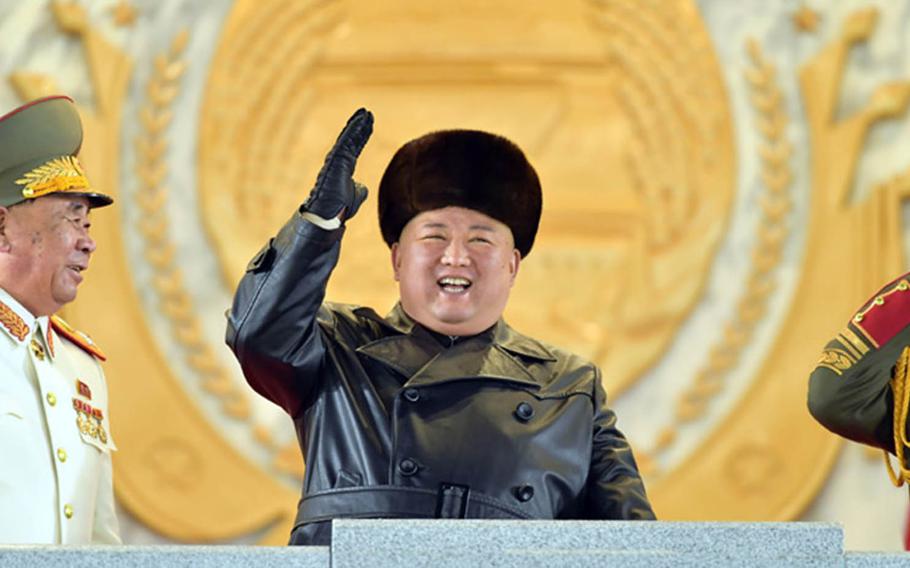
North Korean leader Kim Jong Un attends a military parade in Pyongyang in this undated photo from the Korean Central News Agency. (KCNA)
TOKYO – North Korea will likely restart nuclear weapon and missile activity, spurring Japan and South Korea to cooperate on security, a Japanese foreign policy expert told journalists Thursday.
The prediction was part of an analysis of Japanese foreign policy provided by Keio University professor Ken Jimbo, a security and foreign affairs expert, hosted by the Japan Foreign Press Center via video conference.
It came just hours before a North Korean military parade unveiled an apparent new short-range ballistic missile that likely runs on solid fuel and what appeared to be a new submarine-launched ballistic missile.
And it followed a speech Monday by South Korean President Moon Jae-in, who promised a stronger alliance with the United States under the incoming administration of President-elect Joe Biden.
“The Biden administration will give us more expectation and hope that the U.S. will go back to the policy of utilizing alliances and … giving importance to multilateralism,” Jimbo said.
The United States has made efforts to coax its strongest allies in the Far East to cooperate. U.S. officials, for example, successfully urged Seoul not to follow through on a threat to pull out of an intelligence sharing pact with Japan in 2019.
But relations have been strained. Last week, a South Korean court ordered Japan to compensate “comfort women” forced to work in military brothels during World War II. A previous court decision awarded damages to South Koreans forced into labor by the Japanese during the war.
There are no signs that these issues will be resolved any time soon but shared concern about North Korea will spur Japan and South Korea to work together, Jimbo said.
“North Korea will likely resume its missile and nuclear activities and the environment on the Korean Peninsula will become more tense, which means cooperation between Japan and South Korean will become inevitable,” he said.
High profile summits between President Donald Trump and North Korean leader Kim Jong Un in 2018 and 2019 produced no breakthrough on efforts to denuclearize the divided peninsula; however, in the past four years the North has not resumed the nuclear weapon and long-range missile tests carried out between 2006 and 2017.
In October, during the final debate before the U.S. presidential election, Biden called Kim a “thug” but said he would meet with him if the communist state agrees to denuclearize.
There aren’t signs of any major foreign policy changes yet under Japanese Prime Minister Yoshihide Suga, who took over from longtime leader Shinzo Abe in September, Jimbo said.
Japanese plans for Aegis Ashore missile-defense systems have been shelved in favor of Aegis-equipped warships, and there are no moves to procure a capability to strike enemy bases, he said.
Jimbo also told reporters that China is likely to emerge from the coronavirus pandemic emboldened.
The world’s most populous nation likely accounted for 16.8% of global gross domestic product in 2020, up from 14.2% in 2016, before it entered a trade war with the United States.
By comparison, the U.S. is expected to account for 22.2% compared to 22.3% in 2016, the Wall Street Journal reported Wednesday.
A prime concern for Japanese people is that the U.S. and China might strike a grand bargain that circumvents their country. However, there has been bipartisan support for the Trump administration’s hardline approach to China, Jimbo said.
“With the start of the Biden administration the harsh attitude to China will continue,” he said. “The grand bargain between the U.S. and China is less of a concern.”
Japan’s other major concern regarding the U.S. is that it might not commit to security in Asia, Jimbo said.
“The military commitment by the U.S. might become weaker,” he said. “There must be careful follow up and observation of what happens with the [U.S. National Defense Authorization Act] and the budget,” he said.
The power balance in the U.S. Democratic Party will impact this issue, Jimbo added.
“If the left wing of the Democrats become stronger and if the Biden administration reduces the defense budget, although the administration might say they give importance to bilateral relations it might be that it is not possible” to limit the expansion of Chinese power, he said.
robson.seth@stripes.com Twitter: @SethRobson1